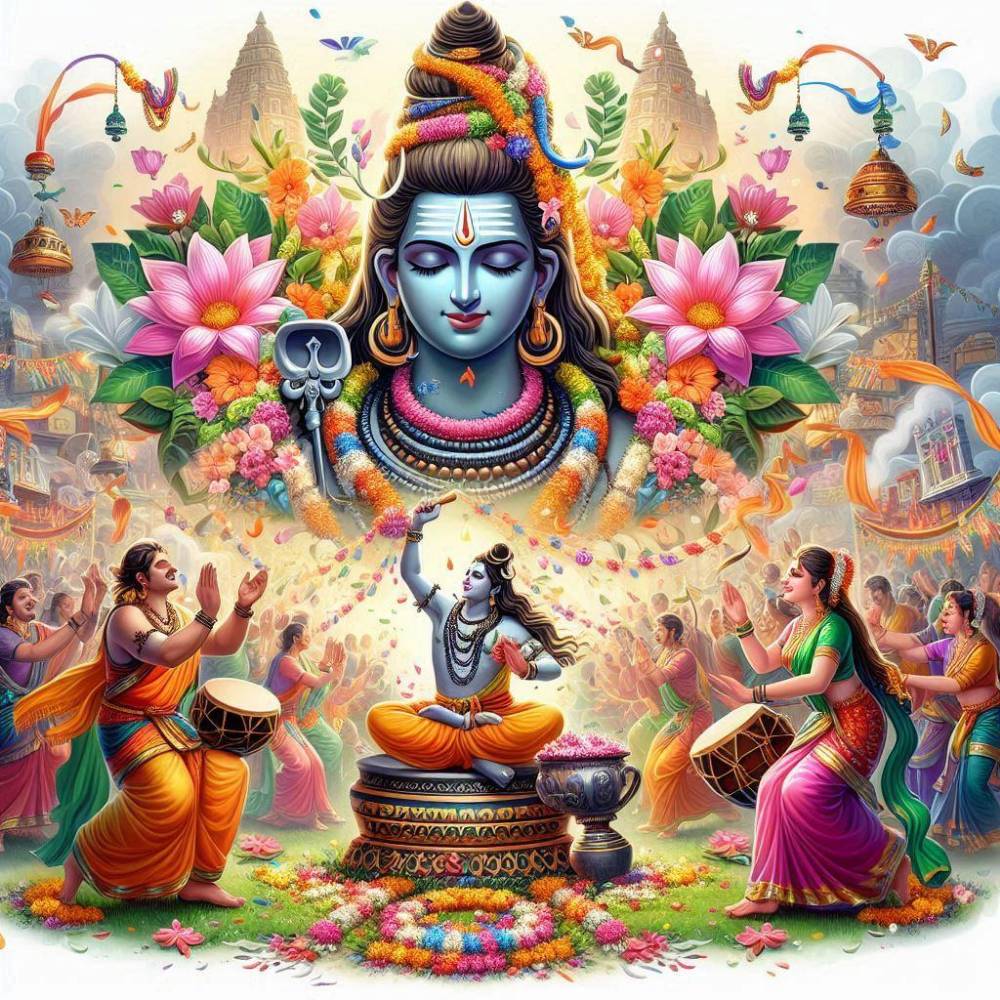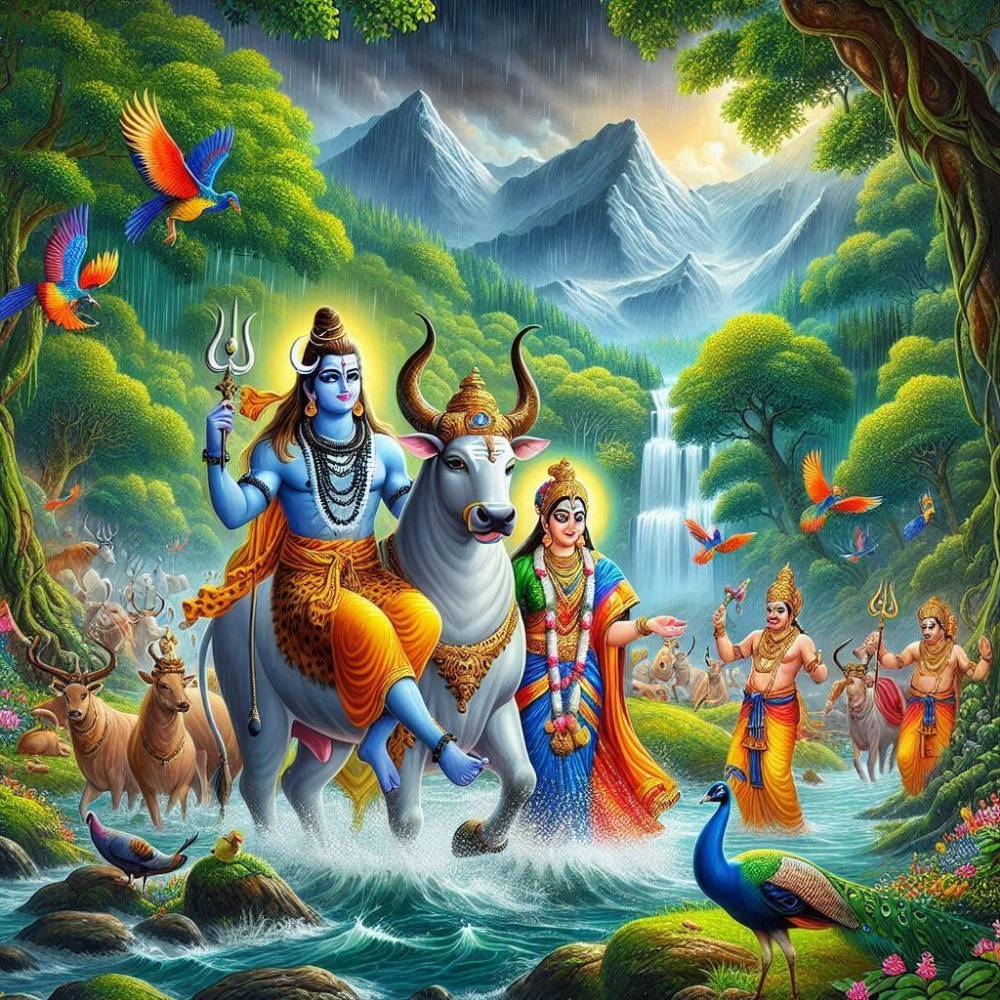Sawan: Celebrating the Holy Month of Lord Shiva

Sawan 2024, also known as Shravan, is a deeply significant month in the Hindu calendar dedicated to Lord Shiva. Starting on July 22 and concluding on August 19, this auspicious period encompasses five Mondays, known as Sawan Somwar, which are observed with fasting and prayers by devotees. The month is intertwined with the monsoon season and is celebrated with various festivals, including Nag Panchami and Raksha Bandhan, highlighting its spiritual and cultural importance in Hindu traditions.
How is Sawan Celebrated in Different Regions of India
North India
- Temple Visits: Devotees visit temples like Kashi Vishwanath in Varanasi, Mahakaleshwar in Ujjain, and Baba Baidyanath in Deoghar to offer prayers.
- Kanwar Yatra: A significant tradition where devotees travel barefoot to collect Gangajal from Haridwar and offer it to Shiva Lingas.
- Sawan Somwar: Devotees observe fasts, abstain from grains and non-vegetarian food, visit temples, perform Rudrabhishek, and chant mantras like ‘Om Namah Shivaya.’
South India
- Regional Variations: In states like Maharashtra, Gujarat, and Karnataka, the Sawan Somwar Vrat dates differ, falling in August-September.
- Devotee Gatherings: Temples like Babulnath in Mumbai see large influxes of devotees.
- Common Rituals: Offering milk, water, bel leaves, fruits, and flowers to the Shiva Linga.
East and Central India
- Temple Visits: Devotees visit Baba Baidyanath in Deoghar and Mahakaleshwar in Ujjain.
- Sawan Melas: Fairs and cultural programs are organized, adding to the festive atmosphere.
West India
- Fasting and Rituals: Devotees observe fasts on Sawan Mondays, visit temples, and perform rituals like Abhishek.
- Popular Temples: The Gauri Shankar Temple in Delhi’s Chandni Chowk sees large gatherings.
Despite regional differences, the essence of Sawan remains the same across India – a time to seek Lord Shiva’s blessings, purify the soul, and celebrate the divine union of Shiva and Parvati through various rituals and traditions.
Unique Rituals at Key Temples During Sawan
Kashi Vishwanath Temple
- Mangala Aarti: Conducted daily from 3 to 4 AM.
- Mid-Day Bhog Aarti: Held from 11:30 AM to 12 PM.
- Sapta Rishi Aarti: Performed in the evening from 7 to 8:30 PM.
- Shringar/Bhog Aarti: Begins at 10:30 PM, concluding the day’s rituals.
Haridwar
- Kanwar Yatra: Devotees collect sacred Ganga water to offer to Lord Shiva.
- Holy Dips: Pilgrims take ritualistic dips in the Ganga at Har Ki Pauri.
Ujjain
- Bhasma Aarti: A significant ritual involving the offering of sacred ash to the deity at the Mahakaleshwar Temple.
Deoghar
- Rudrabhishek: Devotees perform this special ritual at Baba Baidyanath Temple.
The Role of Ganga Jal in Sawan Celebrations
Ganga Jal plays a central role in the Sawan celebrations at Deoghar:
- Kanwar Yatra: Devotees carry sacred Ganga water to offer at the Baba Baidyanath Temple for the Rudrabhishek ritual.
- Jalabhishek: Millions of devotees visit Deoghar to collect Ganga Jal and perform the Jalabhishek, offering the holy water to the Shiva Lingam.
Importance of Sawan Maah
Sawan, or Shravan, is highly revered in Hinduism, dedicated to Lord Shiva. Its significance includes:
- Spiritual Cleansing: Sawan coincides with the monsoon season, symbolizing purification and renewal.
- Historical Mythology: Linked to the Samudra Manthan, where Lord Shiva consumed poison to save the universe.
- Rituals and Fasts: Devotees observe rigorous fasts, especially on Sawan Somwar, seeking blessings for health, prosperity, and marital happiness.
- Festivals: Sawan features various festivals such as Nag Panchami, Raksha Bandhan, and Kamika Ekadashi.
Key Festivals Celebrated During Sawan Maah
- Sawan Somvar: Dedicated to fasting and special prayers for Lord Shiva.
- Nag Panchami: Worshipping snakes, symbolizing fertility and protection.
- Teej: Celebrated by women, marking the arrival of the monsoon.
- Raksha Bandhan: Symbolizes the bond between brothers and sisters.
- Shravani Purnima: Performing rituals and tying the sacred thread (rakhi)
Foods to Avoid During Sawan 2024
During Sawan 2024, devotees often follow specific dietary restrictions to honor Lord Shiva and enhance their spiritual practice. Here are some foods to avoid:
- Non-Vegetarian Food: Abstain from meat, fish, and eggs.
- Alcohol: Avoid all forms of alcoholic beverages.
- Garlic and Onion: These are considered tamasic and should be avoided.
- Grains and Pulses: Many devotees avoid regular grains like rice and wheat and pulses.
- Spicy and Oily Foods: Limit intake of overly spicy and greasy dishes.
- Caffeinated Beverages: Avoid tea, coffee, and other caffeinated drinks.
- Processed Foods: Steer clear of processed and junk foods.
- Certain Vegetables: Some avoid brinjals, tomatoes, and leafy greens.
Sticking to a sattvic diet, which includes fruits, dairy, nuts, and certain flours like buckwheat, is encouraged during this holy month.
7 Healthy Fasting Tips for the Month of Sawan
Observing fasting during Sawan can be spiritually enriching, but maintaining health is equally important. Here are seven tips to help you fast healthily during this sacred month:
-
Stay Hydrated: Drink plenty of water between fasting periods to stay hydrated and support overall health.
-
Include Nutrient-Rich Foods: Opt for nutrient-dense foods like fruits, nuts, and dairy products to ensure you get essential vitamins and minerals.
-
Avoid Heavy Meals: Break your fast with light, easily digestible foods to avoid digestive discomfort.
-
Limit Caffeine Intake: Reduce or eliminate caffeine from your diet, as it can lead to dehydration and affect your energy levels.
-
Monitor Salt Intake: Excess salt can cause dehydration and high blood pressure. Use it sparingly in your meals.
-
Practice Portion Control: Avoid overeating during non-fasting hours. Eat moderate portions to maintain energy levels and prevent digestive issues.
-
Listen to Your Body: Pay attention to how your body responds to fasting and adjust your food intake and hydration accordingly.
Following these tips can help you maintain your health while observing the fasting practices during Sawan.
Significance of the Kanwar Yatra During Sawan

The Kanwar Yatra is a powerful expression of devotion and faith in Lord Shiva, with millions of devotees undertaking the pilgrimage to collect sacred Ganga water and offer it at Shiva temples. The journey promotes spiritual transformation, unity, and community bonding among devotees.
FAQs About Sawan
What is Sawan Somwar?
Sawan Somwar refers to the Mondays in the month of Sawan, dedicated to fasting and offering prayers to Lord Shiva.
How is Ganga Jal used during Sawan?
Devotees collect Ganga Jal during the Kanwar Yatra and use it for performing Jalabhishek and Rudrabhishek rituals at Shiva temples.
What is the significance of Nag Panchami?
Nag Panchami, celebrated on the fifth day of the bright half of Shravan, involves worshipping snakes, symbolizing fertility and protection.
What is the Kanwar Yatra?
The Kanwar Yatra is a pilgrimage where devotees collect sacred Ganga water and offer it at Shiva temples, especially during Sawan.
Why is Sawan important in Hinduism?
Sawan is dedicated to Lord Shiva, symbolizing purification, spiritual cleansing, and renewal, and is associated with various significant rituals and festivals.
By understanding these aspects, devotees can fully appreciate the spiritual and cultural richness of Sawan, making it a time of heightened devotion and celebration.
Q: Why should certain foods be avoided during Sawan 2024?
A: During Sawan 2024, devotees avoid specific foods to adhere to traditional fasting practices and honor Lord Shiva. The dietary restrictions help maintain spiritual discipline and purity.
Q: What types of food are considered unsuitable during Sawan?
A: Foods to avoid include non-vegetarian items (meat, fish, eggs), alcohol, garlic, onions, regular grains (rice, wheat), pulses, spicy and oily foods, caffeinated beverages, processed foods, and certain vegetables like brinjals and tomatoes.
Q: Can I consume fruits during Sawan 2024?
A: Yes, fruits are generally allowed and recommended during Sawan. They are considered sattvic and are a nutritious option for those observing fasting.
Q: Are there any specific vegetables I should avoid during Sawan?
A: During Sawan, some devotees avoid vegetables like brinjals, tomatoes, and certain leafy greens, as they may not align with the traditional fasting guidelines.
Q: What alternatives can I include in my diet during Sawan?
A: Consider including sattvic foods such as fruits, dairy products, nuts, and flours like buckwheat. These alternatives align with the dietary practices observed during the holy month.
Q: Is it okay to drink tea or coffee during Sawan 2024?
A: It is generally recommended to avoid caffeinated beverages like tea and coffee during Sawan. Opting for herbal teas or water is a better choice.
Q: Can I consume processed foods during Sawan?
A: Processed and junk foods are typically avoided during Sawan. Focusing on fresh, natural, and sattvic foods is encouraged for maintaining spiritual discipline.